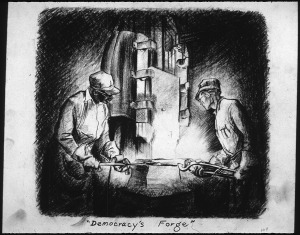3 February
2012
Democracy, Morality and the Common Good
Posted in Big Society, British Politics, Christianity, Civil Liberties, Conscience, Culture, Human Rights, Liberty, Moral Philosophy, Philosophy, Religion, Virtue
From a guest blogger: A position commonly held by ‘reformers’ in various religious traditions in this country may be summarised roughly in the following lines:
If the central authority of a religion is at odds with beliefs held by the majority of that its adherents, the former is duty-bound to reconsider and even to change its position on matters of doctrine.
Something very like this is proposed by Andrew Brown in today’s Guardian. He suggests that, since a significant number of Anglicans want civil partnerships to be formally contracted in churches, certain members of the clerical hierarchy should stop complaining about the break with tradition and jolly well embrace the ‘future’ that this vocal body of vicars and laity desire.
Such argumentation (if we may so glorify such thinking) seems endemic in British politics as well as religion: large numbers of people must be right; or we must at least have the courage to accept any bad moral fallout simply because there are more people to take the blame. This could be styled the camaraderie of error. Even if my friends and I are wrong, we have the bond of our friendship to support us. It is, contrariwise, very unpleasant to be wrong and alone in one’s error.
Of course an ethical position does not exist in a vacuum, for we belong in society. The relativistic idea that every man is an island, each with his own morality, is patently false. We can privatise morals no more than we can society. Moral individualism always fails to provide a shared set of beliefs about what is right and what wrong. Privatisation means either destroying morality since it can no longer be shared, or leaving it as the preserve of an elite class of ‘moral’ people who look down on others with disdain and potentially prejudice. Indeed, the otherwise questionable notion that a large number of people are probably right on a particular matter of faith or morals is at least consistent with morality as something not just for autonomous, isolated individuals, but rather for everyone.
Large groups of people are often worth listening to on moral matters. The larger the group, the lower (perhaps in most cases) the likelihood that a moral position is put forward on unusual or unsustainable grounds. ‘Strange cases make strange laws’, and strangeness can be ironed out a little across large groups. Nonetheless, to appeal to nothing more than public consensus is not only dangerous, but actually as false in its basis as the idea that each person can have a distinct morality. 
Morality is either for all, or for none. Large, noisy groups, however interesting, cannot be the final arbiters of right and wrong. When consensus becomes our sole guiding light it may all-too-often seem morally legitimate for a majority to oppress a minority, and that, surely, is immoral.
To declare what is right and what is wrong a good understanding is needed not only of Man but also of Society. If we are to keep a public morality at all we must identify a moral goal for our society, a goal indeed which morality is the means of attaining. Any vision of what is moral, whether it involves civil partnerships, employment law, or taxation, must necessarily ask what society is for and how certain moral means will enable us to reach its final goal. Furthermore, I must pursue The Good not simply for my own sake, nor for that of just those at either the bottom or the top of the societal pile, but rather for everyone.
The test for a moral system, then, ought not to be what large numbers of people support at any one time or another. Nor must it entail the abandonment of morality in allowing any action which does not entail harm to, or coercion of, others. The Good should draw people together, not isolate them. It must make society stronger, not fragment it further. It ought to lead to growth, not only in numbers, but also in knowledge and charity.
Starting with work the philosopher, Alasdair Macintyre, observes that, if a man is a fisherman, he ought to do whatever a fisherman ought to do. His work is social and not only brings people together, but also makes them stronger. There is moral virtue in work, whether in fishing, corporate governance or art. It is a virtue that seeks the common good whether or not everyone eats fish or enjoys paintings. There may be nothing democratic in the hierarchy aboard a ship or in a religion, and it is not democratic criteria that demonstrate their value and usefulness. Rather, it is the strength they give society. Indeed, what is morally good must be capable of strengthening all the members of society. It must be universal. If truly universal The Good is also unchanging, and no different now from a millennium ago, and it must be truly semper idem.
Related Posts:
Leave a Reply